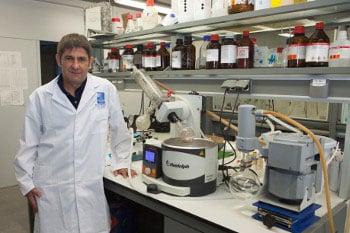
José Mata
By combining graphene and organometallic compounds, researchers have developed graphene-based materials that can catalyze reactions for the conversion and storage of energy.
Researchers at the Universitat Jaume I have developed materials based on graphene that can catalyze reactions for the conversion and storage of energy. The technology patented by the UJI combines graphene and organometallic compounds in a single material without altering the most interesting properties of graphene, such as its electrical conductivity.
The technology, developed by the Group of Organometallic Chemistry and Homogeneous Catalysis (QOMCAT) of the UJI, is of great interest to the energy industry and is part of the so-called “hydrogen economy”. An alternative energetic model in which energy is stored as hydrogen. In this regard, the materials patented by the UJI allow catalyzing reactions for obtaining hydrogen from alcohols and may also serve as storage systems of this gas.
It is a novel technology since it uses graphene for the first time as a support of organometallic compounds. These hybrid materials have catalytic properties and are modular and recyclable. Thus, the catalyst developed at the UJI can be recycled ten times without suffering a loss of activity, a very attractive property from the industrial viewpoint.
The new material is also obtained from a novel system of obtaining hybrid materials in a single step. An easy and affordable system that allows all the technology that is currently based on graphene can be easily converted using these new materials. Thus, the patented materials can be used both in the development of catalysts as well as storage batteries or other energy types.









Be the first to comment on "UJI Patents New Graphene-Based Catalysts"